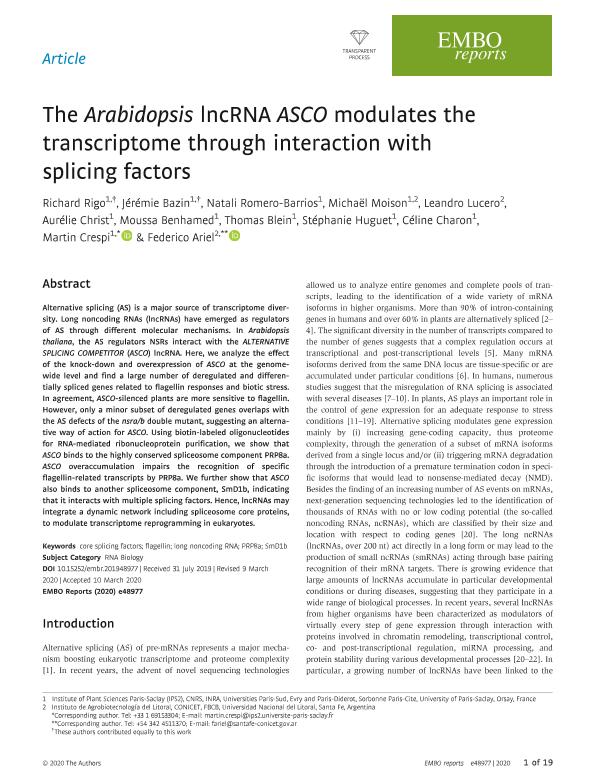Artículo
The Arabidopsis lncRNA ASCO modulates the transcriptome through interaction with splicing factors
Rigo, Richard; Bazin, Jérémie; Romero Barrios, Natali; Moison, Michael ; Lucero, Leandro Exequiel
; Lucero, Leandro Exequiel ; Christ, Aurelie; Benhamed, Moussa; Blein, Thomas; Huguet, Stephanie; Charon, Celine; Crespi, Martin; Ariel, Federico Damian
; Christ, Aurelie; Benhamed, Moussa; Blein, Thomas; Huguet, Stephanie; Charon, Celine; Crespi, Martin; Ariel, Federico Damian
 ; Lucero, Leandro Exequiel
; Lucero, Leandro Exequiel ; Christ, Aurelie; Benhamed, Moussa; Blein, Thomas; Huguet, Stephanie; Charon, Celine; Crespi, Martin; Ariel, Federico Damian
; Christ, Aurelie; Benhamed, Moussa; Blein, Thomas; Huguet, Stephanie; Charon, Celine; Crespi, Martin; Ariel, Federico Damian
Fecha de publicación:
04/2020
Editorial:
Nature Publishing Group
Revista:
Embo Reports
ISSN:
1469-221X
Idioma:
Inglés
Tipo de recurso:
Artículo publicado
Clasificación temática:
Resumen
Alternative splicing (AS) is a major source of transcriptome diversity. Long noncoding RNAs (lncRNAs) have emerged as regulators of AS through different molecular mechanisms. In Arabidopsis thaliana, the AS regulators NSRs interact with the ALTERNATIVE SPLICING COMPETITOR (ASCO) lncRNA. Here, we analyze the effect of the knock-down and overexpression of ASCO at the genome-wide level and find a large number of deregulated and differentially spliced genes related to flagellin responses and biotic stress. In agreement, ASCO-silenced plants are more sensitive to flagellin. However, only a minor subset of deregulated genes overlaps with the AS defects of the nsra/b double mutant, suggesting an alternative way of action for ASCO. Using biotin-labeled oligonucleotides for RNA-mediated ribonucleoprotein purification, we show that ASCO binds to the highly conserved spliceosome component PRP8a. ASCO overaccumulation impairs the recognition of specific flagellin-related transcripts by PRP8a. We further show that ASCO also binds to another spliceosome component, SmD1b, indicating that it interacts with multiple splicing factors. Hence, lncRNAs may integrate a dynamic network including spliceosome core proteins, to modulate transcriptome reprogramming in eukaryotes.
Palabras clave:
CORE SPLICING FACTORS
,
FLAGELLIN
,
LONG NONCODING RNA
,
PRP8A
,
SMD1B
Archivos asociados
Licencia
Identificadores
Colecciones
Articulos(IAL)
Articulos de INSTITUTO DE AGROBIOTECNOLOGIA DEL LITORAL
Articulos de INSTITUTO DE AGROBIOTECNOLOGIA DEL LITORAL
Citación
Rigo, Richard; Bazin, Jérémie; Romero Barrios, Natali; Moison, Michael; Lucero, Leandro Exequiel; et al.; The Arabidopsis lncRNA ASCO modulates the transcriptome through interaction with splicing factors; Nature Publishing Group; Embo Reports; 21; 5; 4-2020; 1-19
Compartir
Altmétricas



